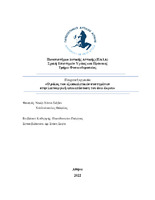| dc.contributor.advisor | Papathanasiou, George | |
| dc.contributor.advisor | Στάση, Σοφία | |
| dc.contributor.author | Νοσίρ-Χάννα, Στήβεν | |
| dc.contributor.author | Χαλδαιόπουλος, Θεόφιλος | |
| dc.date.accessioned | 2022-09-30T06:23:56Z | |
| dc.date.available | 2022-09-30T06:23:56Z | |
| dc.date.issued | 2022-09-26 | |
| dc.identifier.uri | https://polynoe.lib.uniwa.gr/xmlui/handle/11400/2939 | |
| dc.identifier.uri | http://dx.doi.org/10.26265/polynoe-2779 | |
| dc.description.abstract | Εισαγωγή: Τα εξωσκελετικά συστήματα του άνω άκρου, αποτελούν μια επικουρική μέθοδο αποκατάστασης σε ασθενείς με νευρολογικές και ορθοπαιδικές παθήσεις ή κακώσεις.
Σκοπός: Η διεξαγωγή μίας βιβλιογραφικής ανασκόπησης που μελετά την επίδραση των εξωσκελετικών συστημάτων στην λειτουργική αποκατάσταση της άκρας χείρας.
Μέθοδος: Οι βάσεις δεδομένων που χρησιμοποιήθηκαν για την αναζήτηση των ερευνών ήταν οι PubMed, Scopus, Google Scholar, Cochrane Library και η Science Direct από το 2008 έως σήμερα. Για την αξιολόγηση της μεθοδολογικής ποιότητας των ερευνών χρησιμοποιήθηκε η κλίμακα PEDro.
Αποτελέσματα: Στην παρούσα πτυχιακή εργασία συμπεριλήφθηκαν 12 έρευνες. Από αυτές, 10 έρευνες μελετούν τη λειτουργικότητα, 7 έρευνες ασχολούνται με τη μυϊκή δύναμη, 7 έρευνες ασχολούνται με το εύρος τροχιάς, 5 έρευνες μελετούν τη σπαστικότητα και 1 έρευνα μελετά τον πόνο. Γενικά, σε όλες τις προαναφερόμενες μελέτες ανευρέθηκαν στατιστικώς σημαντικά αποτελέσματα εκτός από μία. Σύμφωνα με την κλίμακα PEDro, στην ανασκόπηση περιλαμβάνονται 6 έρευνες υψηλής μεθοδολογικής ποιότητας και 6 έρευνες μέτριας μεθοδολογικής ποιότητας.
Συμπέρασμα: Συνοψίζοντας, η παρούσα συστηματική βιβλιογραφική ανασκόπηση έδειξε πως η αξιοποίηση ενός εξωσκελετικού μηχανισμού και η ορθή ενσωμάτωσή του σε ένα εξατομικευμένο θεραπευτικό πλάνο νευρολογικών και ορθοπαιδικών περιστατικών, λειτουργεί αποδοτικά και συμπληρωματικά της συμβατικής φυσικοθεραπείας. Η εφαρμογή εξωσκελετού έδειξε στατιστικώς πολύ σημαντική βελτίωση στις μεταβλητές της λειτουργικότητας και του εύρους τροχιάς και μεγάλη βελτίωση στις μεταβλητές της δύναμης και της σπαστικότητας. Τέλος, η μεταβλητή του πόνου βελτιώθηκε, αλλά τα δεδομένα δεν επαρκούν για σαφή συμπεράσματα, καθώς ο πόνος μελετήθηκε μόνο σε μία έρευνα. Επομένως, λαμβάνοντας υπόψιν τους περιορισμούς της παρούσας πτυχιακής εργασίας, αναφέρονται προτάσεις για την πραγματοποίηση νέων μελετών σχετικά με την επίδραση των εξωσκελετών στην αποκατάσταση νευρολογικών και ορθοπαιδικών τραυματισμών, με στόχο την εγκυρότερη επιβεβαίωση της θετικής επίδρασής τους στην αποκατάσταση. | el |
| dc.format.extent | 71 | el |
| dc.language.iso | el | el |
| dc.publisher | Πανεπιστήμιο Δυτικής Αττικής | el |
| dc.rights | Αναφορά Δημιουργού - Μη Εμπορική Χρήση - Παρόμοια Διανομή 4.0 Διεθνές | * |
| dc.rights | Attribution-NonCommercial-NoDerivatives 4.0 Διεθνές | * |
| dc.rights.uri | http://creativecommons.org/licenses/by-nc-nd/4.0/ | * |
| dc.subject | Wrist | el |
| dc.subject | Fingers | el |
| dc.subject | Rehabilitation | el |
| dc.subject | Exoskeleton | el |
| dc.subject | Robotic devices | el |
| dc.title | Ο ρόλος των εξωσκελετικών συστημάτων στην λειτουργική αποκατάσταση του άνω άκρου | el |
| dc.title.alternative | The role of exoskeleton systems in the functional rehabilitation of upper limb | el |
| dc.type | Πτυχιακή εργασία | el |
| dc.contributor.committee | Papathanasiou, George | |
| dc.contributor.committee | Στάση, Σοφία | |
| dc.contributor.committee | Στάμου, Μαγδαληνή | |
| dc.contributor.faculty | Σχολή Επιστημών Υγείας & Πρόνοιας | el |
| dc.contributor.department | Τμήμα Φυσικοθεραπείας | el |
| dc.description.abstracttranslated | Introduction: The exoskeleton systems of the upper limb, is an auxiliary method on the rehabilitation of neurological and orthopaedics patients.
Purpose: To conduct a bibliographic review, which examines the effectiveness of the exoskeleton systems on the functional rehabilitation of the distal hand.
Methods: Research of 4 electronic databases, PubMed, Scopus, Google Scholar
and Cochrane Library, was conducted. The methodological quality of the randomized controlled trials (RCTs) was assessed using the PEDro scale.
Results: 12 RCTs were selected and included in the present bibliographic review. 5 RCTs examine only the effect on the wrist joint, 1 RCT examine only the effect on the fingers and 6 examine the effect on the wrist and on the fingers. Additionally, 10 researches study functional ability, 7 researches study muscle strength, 7 researches study range of motion, 6 researches study spasticity and 1 research study pain. In general, all of the above clinical trials found statistically significant effects except for 1. PEDro scale revealed 6 surveys of high methodological quality and 6 surveys of fair methodological.
Conclusions: In summary, the present systematic bibliography review suggests that the utilization of an exoskeletal mechanism and its proper integration into an individualized treatment plan for neurological and orthopedic patients, is a pioneering and emerging approach that works effectively in addition to conventional physiotherapy. Exoskeleton application showed a statistically significant improvement especially in the variables of functionality and range of motion, followed by the improvement in the variables of strength and spasticity. As for the pain variable, it seemed that it was improved but since its evaluation was performed in only one study, further investigation of the effect of this intervention on pain is imperative. In conclusion, taking into account the limitations of this thesis, proposals are made to carry out new randomized controlled trials on the effect of exoskeletal mechanisms on the rehabilitation of neurological and orthopedic injuries for a more extended and valid confirmation of their positive effect on rehabilitation but also for further investigation of the function of exoskeletons. | el |


